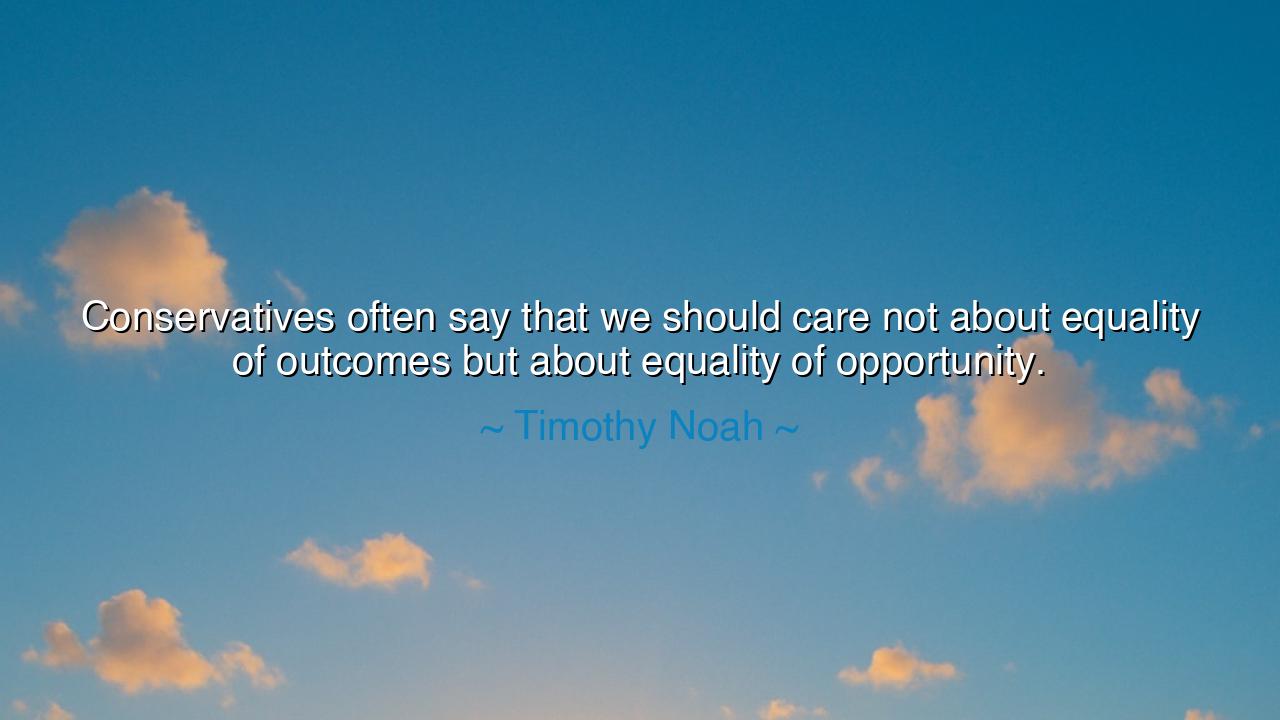
Conservatives often say that we should care not about equality of
Conservatives often say that we should care not about equality of outcomes but about equality of opportunity.






In the thoughtful and analytical words of Timothy Noah, a writer who peers deeply into the structures of modern society, there is contained a reflection both timeless and profoundly relevant: “Conservatives often say that we should care not about equality of outcomes but about equality of opportunity.” This statement is not a mere observation of politics—it is a meditation on one of the oldest debates in the human quest for justice. It asks, at its core, whether fairness lies in giving everyone the same start or in ensuring everyone reaches a similar end. Noah’s insight holds a mirror to civilization itself, for every era has wrestled with this balance between freedom and fairness, between the liberty to rise and the responsibility to lift.
The meaning of this quote lies in its exploration of two great visions of equality. Equality of opportunity means that every person, regardless of birth or circumstance, should have the same chance to pursue happiness, success, and purpose. It is the belief that the doors of life should stand open to all, and that no one should be barred by prejudice, poverty, or privilege. But equality of outcomes seeks something deeper—it asks not only that people begin the race fairly, but that they finish it without unbearable disparity. Timothy Noah’s reflection reveals how these two ideals, though noble, often stand in tension. For while many praise equality of opportunity as freedom’s truest form, Noah reminds us that opportunity without support often becomes illusion—the promise of flight without wings.
The origin of this debate stretches far into the past. The philosophers of old—Aristotle, Plato, and later the Enlightenment thinkers—grappled with the question of justice. In the ancient world, equality was a fragile dream; birth determined destiny. Yet through centuries of struggle, humanity learned that talent and virtue are not confined to rank. The revolutions of modernity, from the American Declaration to the French Revolution, declared that “all men are created equal.” But they spoke chiefly of opportunity—a chance to strive, to earn, to shape one’s own fate. Noah’s words, spoken in our time, remind us that this ideal remains unfinished. The doors of opportunity may be open, but the paths leading to them are not equally clear or walkable for all.
History gives us vivid examples of this struggle. Consider Frederick Douglass, born into slavery, who rose through sheer intellect and resolve to become one of the greatest voices of liberty. He seized opportunity against impossible odds—but even as he triumphed, he saw that not all could. He once said, “Where justice is denied, neither persons nor property will be safe.” His life shows both the beauty and the flaw of opportunity alone—it celebrates human will but exposes the cruelty of systemic constraint. To honor Douglass’s spirit fully, society must do more than grant permission to rise; it must also remove the chains that weigh the climb.
Noah’s insight also exposes a paradox of the modern age. Many claim that opportunity is equal now—that anyone who works hard can succeed. Yet the realities of wealth, education, race, and geography often determine how far effort can reach. A child born in poverty does not begin at the same starting line as one born in privilege. To speak of “equal opportunity” while ignoring such disparities, Noah implies, is to confuse fairness with fortune. True opportunity demands justice in structure, not merely rhetoric in speech. It requires that societies cultivate soil fertile enough for every seed to grow, not only those planted in the gardens of the powerful.
But Noah does not condemn the idea of opportunity—he elevates it by calling for its completion. Equality of opportunity must not be a mask for complacency, but a call to compassion. To create genuine fairness, societies must invest in education, healthcare, and systems that nurture human potential. Opportunity without access is a hollow promise; equality without effort is tyranny. The wisdom lies in harmony—to let liberty and fairness walk together, as wings of the same bird.
Therefore, O listener, take this lesson to heart: strive not only to open the gates of opportunity, but to clear the paths that lead to them. Do not be content that the race is fair if some are barefoot while others wear gold. Work in your home, your community, your country to ensure that chance is not the privilege of the fortunate, but the birthright of all. For when equality of opportunity becomes real—not only spoken—then the greatness of humanity will truly unfold.
And so remember the enduring wisdom of Timothy Noah: the measure of a just society is not merely how high its most gifted can climb, but how freely its humblest can begin. Equality of opportunity is a noble dream—but only when it is made real by compassion, by fairness, and by the unyielding courage to lift others as we climb.






AAdministratorAdministrator
Welcome, honored guests. Please leave a comment, we will respond soon